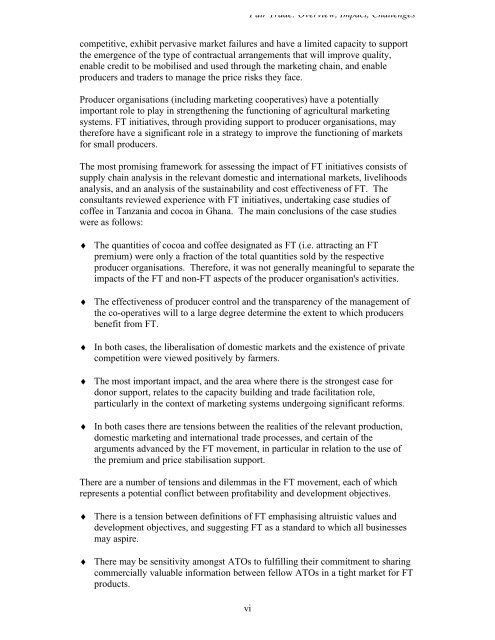Fair Trade: Overview, Impact, Challenges - Are you looking for one ...
Fair Trade: Overview, Impact, Challenges - Are you looking for one ...
Fair Trade: Overview, Impact, Challenges - Are you looking for one ...
Create successful ePaper yourself
Turn your PDF publications into a flip-book with our unique Google optimized e-Paper software.
vi<br />
<strong>Fair</strong> <strong>Trade</strong>: <strong>Overview</strong>, <strong>Impact</strong>, <strong>Challenges</strong><br />
competitive, exhibit pervasive market failures and have a limited capacity to support<br />
the emergence of the type of contractual arrangements that will improve quality,<br />
enable credit to be mobilised and used through the marketing chain, and enable<br />
producers and traders to manage the price risks they face.<br />
Producer organisations (including marketing cooperatives) have a potentially<br />
important role to play in strengthening the functioning of agricultural marketing<br />
systems. FT initiatives, through providing support to producer organisations, may<br />
there<strong>for</strong>e have a significant role in a strategy to improve the functioning of markets<br />
<strong>for</strong> small producers.<br />
The most promising framework <strong>for</strong> assessing the impact of FT initiatives consists of<br />
supply chain analysis in the relevant domestic and international markets, livelihoods<br />
analysis, and an analysis of the sustainability and cost effectiveness of FT. The<br />
consultants reviewed experience with FT initiatives, undertaking case studies of<br />
coffee in Tanzania and cocoa in Ghana. The main conclusions of the case studies<br />
were as follows:<br />
♦ The quantities of cocoa and coffee designated as FT (i.e. attracting an FT<br />
premium) were only a fraction of the total quantities sold by the respective<br />
producer organisations. There<strong>for</strong>e, it was not generally meaningful to separate the<br />
impacts of the FT and non-FT aspects of the producer organisation's activities.<br />
♦ The effectiveness of producer control and the transparency of the management of<br />
the co-operatives will to a large degree determine the extent to which producers<br />
benefit from FT.<br />
♦ In both cases, the liberalisation of domestic markets and the existence of private<br />
competition were viewed positively by farmers.<br />
♦ The most important impact, and the area where there is the strongest case <strong>for</strong><br />
donor support, relates to the capacity building and trade facilitation role,<br />
particularly in the context of marketing systems undergoing significant re<strong>for</strong>ms.<br />
♦ In both cases there are tensions between the realities of the relevant production,<br />
domestic marketing and international trade processes, and certain of the<br />
arguments advanced by the FT movement, in particular in relation to the use of<br />
the premium and price stabilisation support.<br />
There are a number of tensions and dilemmas in the FT movement, each of which<br />
represents a potential conflict between profitability and development objectives.<br />
♦ There is a tension between definitions of FT emphasising altruistic values and<br />
development objectives, and suggesting FT as a standard to which all businesses<br />
may aspire.<br />
♦ There may be sensitivity amongst ATOs to fulfilling their commitment to sharing<br />
commercially valuable in<strong>for</strong>mation between fellow ATOs in a tight market <strong>for</strong> FT<br />
products.
















![CynefinFramework final [Read-Only]](https://img.yumpu.com/19017304/1/190x135/cynefinframework-final-read-only.jpg?quality=85)